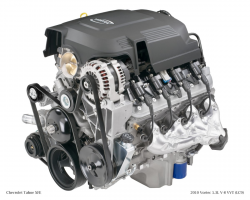
— A GM oil consumption lawsuit has been dismissed after the two plaintiffs who filed the class action failed to adequately plead their case.
According to the GM Vortec engine class action lawsuit, the following vehicles are equipped with allegedly defective Generation IV 5.3 Liter V8 Vortec 5300 engines.
- 2010-2014 Chevrolet Avalanche
- 2010-2014 Chevrolet Silverado
- 2010-2014 Chevrolet Suburban
- 2010-2014 Chevrolet Tahoe
- 2010-2014 GMC Sierra
- 2010-2014 GMC Yukon
- 2010-2014 GMC Yukon XL
The oil consumption lawsuit alleges Vortec engines have defective piston rings that cause cause reduced engine lubricity, engine damage and excessive oil consumption.
The Vortec engine class action lawsuit also claims General Motors knew about the alleged oil consumption problems but failed to tell consumers who must pay for engine repairs out-of-pocket.
Missouri plaintiff Michael Tucker purchased a 2013 GMC Sierra in 2013 with a Vortec engine that allegedly started consuming excessive amounts of oil when it had approximately 75,000 miles on the odometer.
Michigan plaintiff Robert Riddell purchased a new 2012 Chevrolet Silverado with a Gen IV Vortec engine. Riddell alleges his GM truck started consuming oil after 25,000 to 30,000 miles of use.
The GM oil consumption lawsuit alleges the automaker was aware of the alleged problem and cited GM advertisements and public statements that generally refer to the performance, power and fuel economy of GM’s vehicles.
Judge Dismisses the GM Oil Consumption Lawsuit
Judge Stephen N. Limbaugh, Jr. says the Vortec engine allegations are "materially identical to those asserted in Sloan, et al. v. General Motors LLC." That Vortec engine class action lawsuit originally included GM customers nationwide, but in the end only California, North Carolina and Texas GM owners were included.
Express Warranty Claim
General Motors argues the express warranty claim is barred because the plaintiffs did not give pre-suit notification of their claims in accordance with the warranty.
Missouri law requires the “buyer must within a reasonable time after he discovers or should have discovered any breach [of warranty] notify the seller of breach or be barred from any remedy.” In other words, a plaintiff must establish he “notified the seller of the nonconformity in a timely fashion” to assert an express warranty claim.
The oil consumption lawsuit doesn't allege the plaintiffs brought their vehicles to GM dealerships for repairs or diagnosis, nor did they contact General Motors.
According to the judge, the Vortec engine class action suggests GM was provided notice through other lawsuits and its own knowledge, but reliance on that argument goes against the plain language of the statute (requiring that “the buyer must….notify”).
The judge dismissed the express warranty claim based on no pre-lawsuit notice.
Implied Warranty of Merchantability Claim
According to Judge Limbaugh:
“The implied warranty of merchantability arises by operation of law and does not impose a general requirement that goods precisely fulfill the expectation of the buyer. Instead, it provides for a minimum level of quality.”
The judge further says the plaintiffs fail to state a claim for breach of implied warranty if their allegations do not show the vehicles are unfit for providing transportation.
“[W]here a car can provide safe, reliable transportation[,] it is generally considered merchantable.”
The plaintiffs who filed the lawsuit admit they drove their vehicles for years and for thousands of miles without incident and without noticing any excessive oil consumption. Additionally, they don't allege they have stopped driving their vehicles or the vehicles are unsafe or unfit for transportation.
According to the judge, courts routinely dismiss implied warranty claims if the alleged defect does not render vehicles unfit, at least as a matter of law.
And the judge also ruled, “a vehicle is not deemed unsafe for transportation by the off-chance that one of its parts will malfunction.”
The judge also shot down the breach of implied warranty of merchantability claim due to a four-year statute of limitation.
The plaintiffs purchased their vehicles in 2012 and 2013 but did not file their class action lawsuit claims until November 2020. The plaintiffs say the statute of limitations should be ignored because they should be "equitably tolled."
“To constitute concealment of a cause of action within the general rule tolling the statute of limitations on that ground the concealment must be fraudulent or intentional and, ... there must be something of an affirmative nature designed to prevent, and which does prevent, discovery of the cause of action.” – GM oil consumption lawsuit
But the judge ruled the plaintiffs allege no facts showing GM took any “affirmative” actions that were “designed to prevent” the discovery of the allegations or to prevent the filing of the Vortec engine lawsuit.
Missouri Merchandising Practices Act
The judge also dismissed the Missouri Merchandising Practices Act (MMPA) claim after the plaintiffs alleged General Motors omitted the alleged oil consumption defect in its advertising, promotion and sale of the vehicles equipped with the Generation IV 5.3 Liter V8 Vortec 5300 engines.
According to the GM owners who sued, they were damaged by the omissions because they would not have purchased their vehicles or would have paid less for them had GM disclosed the alleged oil consumption issues.
In dismissing the claim, the judge says it has been repeatedly held that advertising constituting “mere puffery” cannot form the basis of an MMPA claim. According to the judge, there is a difference between mere advertising puffery and a statement of fact.
In addition to the above claims, the judge also dismissed unjust enrichment and fraudulent omission claims brought by the two plaintiffs.
The GM oil consumption lawsuit was filed in the U.S. District Court for the Eastern District of Missouri: Tucker, et al., v. General Motors LLC.
The plaintiffs are represented by DiCello Levitt Gutzler LLC, and Beasley, Allen, Crow, Methvin, Portis & Miles, P.C.




